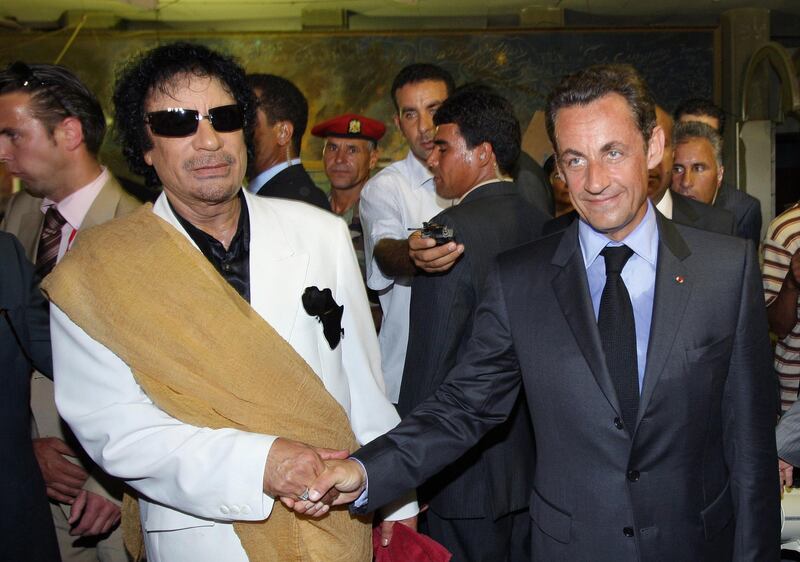The former French president, Nicolas Sarkozy, was held in custody on Tuesday and questioned over claims that the late Libyan leader Muammar Qaddafi paid him 50 million euros to fund a 2007 election campaign.
Mr Sarkozy, 63, was detained at a police station in the northwest of Paris over the explosive allegations that emerged in 2012 during his unsuccessful campaign to be re-elected as French leader.
He can be held for up to 48 hours. Mr Sarkozy has previously described the allegations against him as “grotesque”.
His detention followed allegations by Lebanese businessman, Ziad Takieddine, who claimed in 2016 that he personally handed over three suitcases filled with five million euros to Mr Sarkozy and a senior aide for his campaign fund.
He claimed the handover took place at the interior ministry, where Mr Sarkozy was in charge at the time. The alleged sums would have breached rules limiting funds for elections, and from foreign financing of political campaigns.
Months after he took office, Mr Sarkozy was criticised for hosting a state visit by Qaddafi, which was accompanied by the signing of several business deals. His visit was notable for being allowed to pitch his Bedouin tent close to the Elysee Palace.
______________
Read more:
[ Sarkozy praises UAE's leadership model ]
[ Qaddafi regime funded presidential campaigns in US, Ukraine, France ]
______________
Mr Sarkozy was later one of the chief advocates of a Nato-led military campaign that resulted in Qaddafi’s overthrown and killing at the hands of rebel forces in 2011.
Angered at the role of Mr Sarkozy in backing the rebels, Qaddafi’s son Saif Al Islam in 2011 described Mr Sarkozy as a “clown” and spoke for the first time about the campaign funds.
He demanded money back and threatened to release incriminating banking records saying that Mr Sarkozy had “disappointed” the regime.
The claims were largely ignored but were reignited following claims made by French website Mediapart the following year.
The authorities first launched an inquiry in 2013 but events have moved rapidly this year following the arrest of a French businessman in London in relation to the campaign finance investigation.
Alexandre Djouhri – a fixer who once tried to broker a pact between Qatar and Qaddafi to end the 2011 uprising – was arrested at London’s Heathrow Airport after leaving his home in Switzerland.
He faces allegations including fraud, money laundering and corruption.
His legal team has accused the French government of launching a politically motivated case and claimed that the case was not far enough progressed in France to warrant his arrest. A four-day extradition hearing is due to be held in July, a court official said.
A former top aide of Sarkozy, former minister Brice Hortefeux, was reportedly questioned on Tuesday but was not detained. Bashir Saleh, the former manager of the Libyan sovereign investment fund, fled from France to South Africa days after Mr Sarkozy lost his re-election bid apparently fearing arrest over the scandal. He said in a 2014 interview that claims were “fake”.
Investigators have recently handed to magistrates a report in which they detailed how cash circulated within Sarkozy's campaign team, according to Le Monde newspaper.
Mr Sarkozy has been dogged for years by political funding scandals but has never been convicted.
He was investigated for allegedly receiving illegal political funding for the 2007 election from the late Liliane Bettencourt, France’s richest woman and heir to the L’Oreal cosmetics fortune.
His home and offices were searched after defeat in the 2012 election but officials dropped the investigation the following year. He still faces trial over spending too much money on his failed 2012 campaign.






